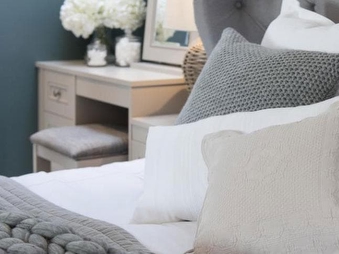
How to use the ‘de-influencing’ trend to de-clutter your bedroom
Learn how the viral de-influencing trend can help you declutter your bedroom. Embrace simplicity and transform your bedroom with de-influencing principles.

Good sleep hygiene is key to living a rested but busy life: good quality sleep is vital for your mental and physical health and is just as important as eating well and getting enough exercise. The amount of sleep you get each night can affect your mood and your concentration, as well as your metabolism and immune function.
Sleep hygiene describes the environment and daily routines that contribute to your overall sleep habits. Good sleep hygiene allows for consistent, uninterrupted sleep, while bad sleep hygiene can leave you feeling drained and frustrated.
Many things can contribute to sleep-related problems, including illness, environmental factors, lifestyle habits, stress and anxiety, jet lag or medication.
So, here we look at ways in which you can help to improve your sleep hygiene for a better night’s sleep.
Sticking to a consistent sleep time and wake up time can help your body’s sleep cycle, called the “circadian rhythm”, get accustomed to the amount of sleep you need. This cycle is tied to your 24-hour body clock. It receives signals based on your environment and then activates certain hormones as well as regulating temperature and metabolism to send you to sleep or keep you awake.
Therefore, establishing a regular sleep schedule will help to keep all other bodily functions in check.
Try to work out a time to go to bed each night and a good time to wake up. This schedule should fit in alongside working, exercising and socialising. Soon you will find yourself naturally getting tired and waking up at similar times.
According to NHS guidelines, most adults need between six to nine hours’ sleep each night, so factor this in when planning your sleep schedule.
As with many things in life, consistent routines are key to building healthy habits – none more so than when it comes to sleep.
Your bedtime routine will be unique to you but should help your body prepare for sleep by recognising certain actions or rituals associated with bedtime. These could include a warm bath, gently brushing your hair, practicing some gentle stretches, reading a few pages of a book or inhaling a few breaths of your favourite essential oil.
The key here is consistency, so choose a couple of simple rituals that are attainable for you to carry out each night and build on your routine with time.
It’s important to allow your mind and body to slow down before bed, so this means no laptops, phones or TV for at least one hour before sleep. These activities do the opposite of preparing you for rest – they stimulate your brain and cause mental chatter as it digests the content from the screens.
Your lifestyle choices throughout the day can also affect your sleep hygiene too. Getting some exposure to natural daylight is really important to help maintain your body’s circadian rhythm. As such, going outdoors as much as possible or working near to a window with natural light coming in will contribute to better regulation.
Eating well and regular exercise will naturally encourage better quality sleep. On the other hand, smoking, consuming alcohol and caffeine or eating highly calorific meals will do the opposite – these damage the quality of your sleep and disrupt your schedule.
Caffeine and alcohol can stay in your system for up to twelve hours and will affect your ability to fall into a deep sleep. When the effects of either substance have worn off from your system in the middle of the night, you might find yourself waking up, unable to drift back off.
Creating a relaxing bedroom environment can also help to improve your sleep hygiene.
Your bedroom should be a place of comfort and calm, so you may need to make some adjustments to your space to create an optimal sleep environment, including:
An additional, often-overlooked factor is bedroom tidiness; if you have lots of mess in your bedroom, then this could be distracting you from drifting off to sleep. After all, a cluttered space can create a cluttered mind.
Therefore, investing in good quality storage, such as fitted wardrobes could really make a difference. Not only do they look stylish and contemporary, but they also allow you to safely store all your clothes and other items out of the way each day, so that your bedroom remains a haven of peace – perfect for a relaxing slumber.
If you are interested in finding out more about how our range of fitted wardrobes could help improve your sleep environment, then book a free design visit with our experts. We are always happy to chat over ideas and solutions to suit your individual needs.

Learn how the viral de-influencing trend can help you declutter your bedroom. Embrace simplicity and transform your bedroom with de-influencing principles.

Explore the many benefits of open-plan living with our detailed guide. This modern interior style combines flexibility and functionality for your home.

Transform your bedroom into a cosy winter retreat with stylish fitted furniture. Our guide offers inspiration for creating a comfortable, organised space.
Whether you have an exact vision in tow, or are just at the beginning stage of your home renovation, we have heaps of inspiration for you to get stuck into.
Find a wealth of design tips, trends and inspiration in the pages of our brochure, magazine and on our blog. Our experts are always ready to help you create dream home, pop in store or book your free design visit for experts to help on bringing your vision to life.